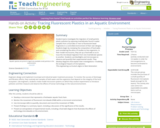
This pathway makes aware of scientific misconduct and introduces how it can be countered by research integrity.
- Subject:
- Biology
- Science
- Material Type:
- Unit of Study
- Provider:
- LabXchange
- Provider Set:
- LabXchange Pathways
- Date Added:
- 10/25/2023

This pathway makes aware of scientific misconduct and introduces how it can be countered by research integrity.

Student teams investigate the migration of small-particle plastic pollution by exposing invertebrates found in water samples from a local lake or river to fluorescent bead fragments in a controlled environment of their own designs. Students begin by reviewing the composition of food webs and considering the ethics of studies on live organisms. In their model microcosms, they set up a food web so as to trace the microbead migration from one invertebrate species to another. Students use blacklights and microscopes to observe and quantify their experimental results. They develop diagrams that explain their investigations—modeling the ecological impacts of microplastics.

"Active Learning, Critical Thinking and Multicultural Education in Communication Ethics" discusses strategies to assist students in dealing with moral issues and to develop higher order thinking in the ethical decision-making process.